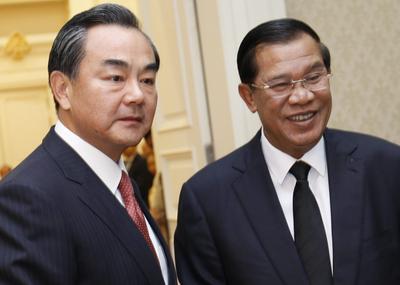Cambodia falls to China’s charm does not come as a surprise. The benefits from being among China’s most favoured nations are quite obvious. Cambodia receives Chinese investments and economic and military aid, both in kind and money, with ‘no strings attached’ — as the saying goes. The Cambodian government depicts China as a big old friend, a friendship that goes back a long time in history and one that has survived many regime changes.
The friendship between China and the current regime in Phnom Penh was confirmed after the 1997 coup. The coup saw the leader of the Cambodian People’s Party, Hun Sen, oust then Prime Minister Prince Norodom Ranariddh, undoing the efforts of the international community to administer peace and good governance in the country since the Paris peace agreements in 1991. While many countries including the United States imposed sanctions on Cambodia for breaching the carefully brokered peace agreement, China sent US$10 million of aid. In this sense, the United States applies the stick when Cambodia side-tracks from the negotiated route to peace and democracy, whereas China offers the carrot instead.
China has always offered instant rewards for displays of loyalty. When the Cambodian government sent 22 Uighur refugees back to China in 2009, the United States once again suspended aid to Cambodia as a retributive measure. China, on the other hand, pledged a total of US$1.2 billion two days after the incident. This generous gesture, however, does not necessarily guarantee that the money is indeed received, as some observers caution.
But looking beyond the ‘big old friend’ rhetoric, what’s in this relationship for China? The strings attached to China’s generosity are undoubtedly strong and many-stranded.
As in all other friendships that China pursues across the world, access to cheap labour, markets and natural resources is paramount. As Chinese labour becomes more expensive and workers become more vocal, Cambodia’s cheap and controlled labour force provides an escape route for Chinese state-owned companies seeking to outsource their production processes to low-cost countries. Moreover, China’s participation in Cambodia’s garment manufacturing brokers access to markets that ordinarily restrict direct imports from China. Conversely, Cambodia benefits from its favoured status in the US and EU markets and helps China evade trade barriers. Cambodia also offers access to the much sought-after natural resources, energy reserves, arable land and agricultural products. Chinese investors have taken advantage of such assets, sometimes to the detriment of the locals. A mounting number of land issues in Cambodia is related to Chinese companies obtaining land concessions for project development, causing Cambodia’s poor to be (forcefully) dislocated.
Without downplaying the economic significance of Cambodia for China, compared to other developing countries — where access to cheap labour, land and natural resources come in abundance — Cambodia’s assets are limited and rapidly declining. Instead, the returns are first and foremost of a political nature, as the ASEAN incident vividly showed.
Cambodia sits in China’s backyard and this location has geopolitical consequences. Cambodia gains strategic importance as one of the pearls in the ‘string of pearls’ that China allegedly has created in Southeast Asia in order to secure military access to the Gulf of Thailand and the South China Sea. This strategic importance has to be understood in view of the competition between China and the United States for military access to Cambodia. The military defence cooperation between the United States and Cambodia, which was established in 2006, is about to expire and the pressing issue is whether this cooperation will be continued or abandoned in favour of a closer military link with China. China, who has few friends in Southeast Asia, would welcome Cambodia discontinuing the deal with the United States.
The recent Cambodian elections left the Hun Sen government weakened while the opposition emerged as a serious player in the Cambodian political arena. What role may China play in this aftermath? According to some analysts, the outcome of the elections foretells trouble for China as it may lose its privileged access to Cambodia. If the political situation in Cambodia escalates, will China support Hun Sen if it comes to a crackdown on the opposition? If history is to repeat itself, then China is likely to remain in the background ready to co-opt whoever emerges as a major political force in post-election Cambodia.
Heidi Dahles is Head of Department and Professor of International Business and Asian Studies at Griffith University.


1. Even though Vietnam is very small neighbor of China, its strategic location and long history of bilateral conflicts has placed Vietnam in every old and new Chinese playbook. With the South China Sea dispute reaching boiling point any time now, pocketing Cambodia is to China both denying US access as well as establishing a southern pressure point against Vietnam.
2. “If the political situation in Cambodia escalates, will China support Hun Sen if it comes to a crackdown on the opposition? If history is to repeat itself…” Yes and yes. Chinese non-interference policy only applies when their “guys” doing the crackdown and history will repeat itself as China watched the last “killing fields” without blinking, why change now?